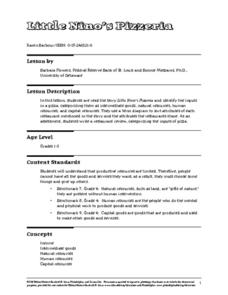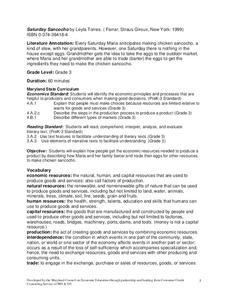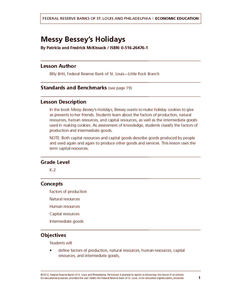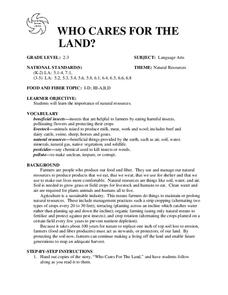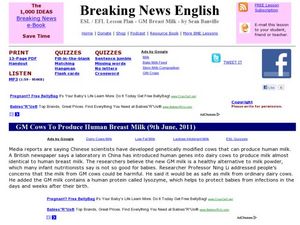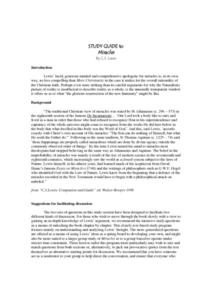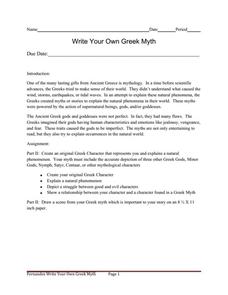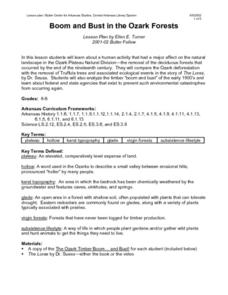Education World
Human Nature- Good or Evil?
Students explore the philosophical nature of good vs. evil. In this literacy/philosophy instructional activity, students read and discuss media articles that illustrate human nature as inherently "good" or "evil." Students practice...
K20 LEARN
Lord of the Flies Unit, Lesson 4: Bad to the Bone
Is the nature of humans inherently good or evil? That is the question scholars consider in the fourth lesson of the Lord of the Flies unit. In a Four Corners activity, they examine statements about human nature and stand by the poster...
K12 Reader
Natural Resources
What natural resources are available in your area? Your learners can consider this question after reading a brief passage about natural and renewable resources. After reading, class members respond to five questions related to the reading.
Curated OER
Lemonade For Sale
2-3rd graders listen to the story, Lemonade for Sale, by Stuart J. Murphy. In the story, children produce and sell lemonade to raise money for their clubhouse, create a product, classify the resources used in production as natural...
Alabama Learning Exchange
Good Litter, Bad Litter
Which ones can be thrown on the ground? Discover the difference between natural litter and unhealthy trash, helping scholars by using several examples. Use the information here to give them a basic background, but also encourage prior...
Federal Reserve Bank
Little Nino's Pizzeria
Engage your youngsters in basic economics by connecting the terms to dessert and pizza! After a discussion about intermediate goods and natural resources, learners read and connect a pizzeria to economic terms.
Curated OER
Saturday Sancocho
Second graders identify the economic principles and processes that are helpful to producers and consumers when making good decisions. Students will read, comprehend, interpret, analyze, and evaluate literary text as well as explain how...
Novelinks
Touching Spirit Bear: The Literary Mandala
Even someone with a dark side can make a good decision—and vice versa. Readers explore Cole's traits and decisions in Ben Mikaelson's Touching Spirit Bear and analyze his sunside and shadowside. They identify a symbol that best...
Federal Reserve Bank
Messy Bessey's Holidays
Teach your class some fairly complex terms—factors of production, human resources, capital resources, natural resources, and intermediate goods—with a storybook (Messy Bessey's Holidays), plenty of visuals and handouts, and related...
Curated OER
Is It Ethical to Eat Meat?
Have your class join a blog about whether or not eating meat is good for you. They'll read several passages regarding meat processing and consumption, then they post what they think. There are six critical-thinking prompts to help them...
Curated OER
Little House In the Big Woods
Students explore economics by reading classic literature with their classmates. In this farm production lesson, students read the famous story Little House in the Big Woods by Laura Ingalls Wilder. Students complete handouts based upon...
Curated OER
Goals, Interactions and Outcomes
Learners recognize both sides of a dilemma through use of a Human Interaction Outline. In this Goals, Interactions and Outcome lesson plan, students create a diagram to show opposing views of fishermen and oil companies. Learners...
Curated OER
WHO CARES FOR THE LAND?
Students explore the importance of natural resources. They are given copies of the story, "Who Cares For The Land," and students follow
along as the teacher reads it. Students identify the key points in the story. (Soil, water and air...
Curated OER
Where's King Solomon when we need him?: Good decisions on resources
Students use geographic information to suggest how to manage natural resources through a simulation. They engage in a simulation, and decide how to protect, allocate, and exploit the resources of a hypothetical location.
K12 Reader
Habitat Destruction
What happens when an animal becomes endangered or extinct? Explore the ways that human influence throughout the environment has threatened the existence of other species with a reading passage. After reading the paragraphs, kids answer...
Council for Economic Education
Teaching Economics Using Children's Literature
Introduce young learners to the subject of economics using their favorite stories and books. Including 24 separate lessons, this guide covers economic principles such as trade, scarcity, consumer goods and services, renewable and...
Curated OER
The Goat in the Rug
Students define productive, capital, human and natural resources and intermediate goods, then classify these things by how they are used in a production process. In this resources/goods lesson plan, students listen to the story The Goat...
Curated OER
Shackleton's Antarctic Adventure
Young scholars research the exploration of Antarctica by the explorer Sir Ernest Shackelton. In this Antarctic exploration lesson, students watch a movie about Sir Ernest Shackelton and his ship the Endurance. Young scholars study a map...
Curated OER
Breaking News: GM Cows to Produce Human Breast Milk
Learners explore current events by reading and analyzing an article in class. In this human diet instructional activity, students read an article about cows which are being genetically modified in order to produce human breast milk for...
C.S. Lewis Foundation
Study Guide to Miracles
Teaching is challenging, so is proving through logic that miracles and divine intervention can happen in this world. It is even more arduous to teach the text of that proposition—good thing there are resources available, like this study...
Frost Middle School
Write Your Own Greek Myth
Invite your pupils to create original Greek characters and myths for their characters to star in. Similar to a traditional Greek myth, the story must explain a natural phenomenon, depict a struggle between good and evil characters, and...
Clever Student Training Company
Logical Fallacies Recognition
“Should same-sex marriage be allowed?” As part of a study of recognizing logical fallacies learners read John Stemberger’s April 12, 2012 argument against same-sex marriage published on the opinion page of the Orlando Sentinel. They then...
Curated OER
Lord of the Flies Anticipation Guide and Activities
“What are we? Humans? Or animals? Or savages?” Ah, the central question of Lord of the Flies. As part of their study of William Golding's riveting novel, readers complete an anticipation guide and respond to a series of survey questions...
Curated OER
Boom and Bust in the Ozark Forests
Here is a hard-hitting, cross-curricular activity on the effects that the deforestation of the Ozark forests in the 19th century had on the people, animals, and ecosystems of the area. The Dr. Seuss book The Lorax is used as a way of...







